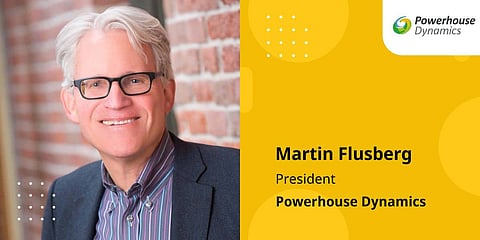

IoT solutions are currently very popular among organizations as they help build massive networks of IoT devices, driving innovation across industries looking for growth opportunities and operational efficiencies. Powerhouse Dynamics is a leading provider of "internet of things" (IoT)-based solutions to connect, analyze, and control equipment to deliver enterprise-wide operational efficiencies for portfolios of commercial facilities, including restaurants, convenience stores, retailers, and others. The company's flagship solutions SiteSage and Open Kitchen enhance equipment performance, provide operational transparency, and significantly reduce energy expenses.
Powerhouse Dynamics is a privately held technology firm focused on using cloud-based controls and analytics to deliver energy and operational efficiencies to its customers. Thousands of locations, including restaurants, convenience stores, retailers, and others, use the SiteSage platform (formerly known as the eMonitor) to save money by centralizing control, analysis, and management of energy-consuming equipment. Engineered specifically for smaller facilities, SiteSage features powerful analytics delivered via simple online and mobile interfaces. The system continuously improves efficiency by controlling major loads, monitoring power consumption and performance of individual pieces of equipment, and tracking gas and water usage. Advanced analytics deliver actionable intelligence via diagnostics and alerts, and SiteSage's enterprise-wide benchmarking helps identify stars and underperforming assets.
Martin Flusberg, CEO of Powerhouse Dynamics is an accidental serial entrepreneur. He joined an MIT faculty software start-up while on the faculty and ended up being the CEO several years later. Powerhouse Dynamics is his fourth start-up and represents his 3rd successful exit. Martin was not the original founder of Powerhouse Dynamics (Ph.D.) but he joined as CEO very early on and was responsible for developing and evolving the business plan and raising capital. He participates in all aspects of the company from finance to sales to product development.
Each prior company Martin worked with provided an experience that helped the next company. Having one failure taught him how to make sure to never run out of cash and this paved the way for taking his last 2 companies to successful exits. His last 3 companies, including the failure, were a little ahead of their time in terms of product, and learning not only how to preserve cash but how to preserve patience has played a key role in eventual success. Martin was CEO of software companies Multisystems, Inc. and REALink SystemsCorp. and ran an energy software unit of TASC that later became Lodestar Corp. since acquired by Oracle. He has also served on the faculty of the Department of Civil and Environmental Engineering at MIT. Martin has an MSCE from MIT and a BEE from the City University of New York. Martin learned that companies evolve like people and expect to continually fine-tune the business model without pivoting wildly from the original business description. He also learned the importance of not trying to expand too quickly or too wide and has seen multiple other companies fail as a result of doing just that. Martin has spent most of his career developing innovative technologies that address climate change; the first half in transportation and the second half in energy.
Powerhouse Dynamics takes the voice of the customer seriously and continually solicits input from all customers. It regularly looks at how the company can innovate the products and go ahead and develop new functionality that it then shows to customers after it has been built (generally then tweaking and not deleting based on their feedback). The product team of the company is always looking to adopt and advance the state of the art.
Powerhouse Dynamics is involved in all of the areas mentioned, except robotics. The company provides a leading IoT-based platform that connects, monitors, and controls equipment for foodservice and retail companies and delivers significant operational efficiencies. The cloud-based system generates significant amounts of data (for one customer, the system generates over 217 billion data points per day). As a result, it is critical to have the appropriate analytics and machine learning to interpret and leverage the data. As IoT expands, this is fast becoming the rule rather than the exception. Effectively leveraging these disruptive technologies can provide significant benefits to adopters. The company's new 'Open Kitchen' has revolutionized foodservice and food retail operations. It provides real-time access and insight into kitchen and equipment operations and shifts from reactive to proactive equipment servicing.
Martin states that the problem with being early to market is that companies end up serving early adopters and it takes much longer than expected to begin to scale. He is well familiar with it. It obviously has implications in terms of cash needs and credibility with investors and makes managing the growth of the company much more challenging.
Martin explains that after years of talk about IoT in the industries we serve, it is finally starting to happen, and we are expanding rapidly. That creates challenges as we expand not just sales but markets and geographies. And the need to continue to innovate on all fronts remains strong. "It has been extremely gratifying to see the concepts we have been promoting finally seeing acceptance. But it is also exciting to know that it is not time to rest on our laurels," he added.
Join our WhatsApp Channel to get the latest news, exclusives and videos on WhatsApp
_____________
Disclaimer: Analytics Insight does not provide financial advice or guidance. Also note that the cryptocurrencies mentioned/listed on the website could potentially be scams, i.e. designed to induce you to invest financial resources that may be lost forever and not be recoverable once investments are made. You are responsible for conducting your own research (DYOR) before making any investments. Read more here.
